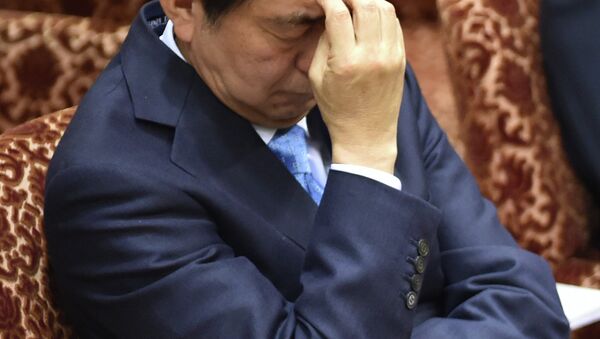WASHINGTON (Sputnik) — According to WikiLeaks' "Target Tokyo" release, the NSA targeted Japanese companies, senior government officials, governmental advisors and even Premier Shinzo Abe from at least September 2006 to September 2007.
"With the fast track authority barely granted to [President Barack] Obama by Congress… Japan, Malaysia — all the negotiating countries on the TPP — will intensify their demands,” Executive Intelligence Review (EIR) Senior Editor Jeff Steinberg told Sputnik.
The 35 WikiLeaks documents released on Friday came at “the worst possible moment for Obama and Japan… [if] you support the Trans-Pacific Partnership,” Steinberg said.
Japanese Prime Minister Shinzo Abe, a vital Obama ally in pushing through the TPP, is likely to be seriously damaged politically by the latest NSA revelations, the analyst said.
“Abe will now be faced with a big nationalist backlash over his cozy relationship with Obama, who spied on him and other top Japanese,” Steinberg pointed out.
Abe’s standing within his own country was likely to be seriously compromised, just as German Chancellor Angela Merkel’s was after similar documents released by WikiLeaks revealed NSA surveillance on Merkel and her top officials and aides, Steinberg observed.
“As bad as Merkel was damaged by the similar WikiLeaks revelations… Abe is even more vulnerable and more likely to be damaged by this scandal.”
The Japanese prime minister was already facing heavy criticism domestically for his US-backed efforts to abolish the pacifist causes in Japan’s post-World War II Constitution, Steinberg observed.
“There are street protests all over Japan against Abe's move to ‘reinterpret’ the Japanese constitution to allow for offensive coalition military operations, and this has weakened Abe's grip on power.”
The enthusiasm of the largest Japanese industrial corporations for the TPP may be dampened by the discovery that the NSA had been spying on them too, Ivan Eland of the Independent Institute told Sputnik on Monday.
“It is common knowledge that all countries spy on even their friends. So this is no surprise, especially after the revelations that the NSA was spying on Angela Merkel and German targets, as well as Brazil.”
Japanese companies would have no legal redress for any damage caused by the leakage of confidential secrets to major foreign rivals, Eland added.
“Local companies can sue, but I think sovereign immunity will prevent them from winning.”
At the end of the day, the Japanese government would have to turn the other cheek and bury whatever anger and humiliation it felt at the WikiLeaks revelations, Eland predicted.
“Japan will pretend to be outraged that a friend was spying on it, all the while knowing that it was probably going on. So a formal protest will be filed, but only to ‘save face’.”
In any case, large companies in every major industrialized nation participated in the practice of industrial espionage against their allies and neighbors, Eland reminded.




